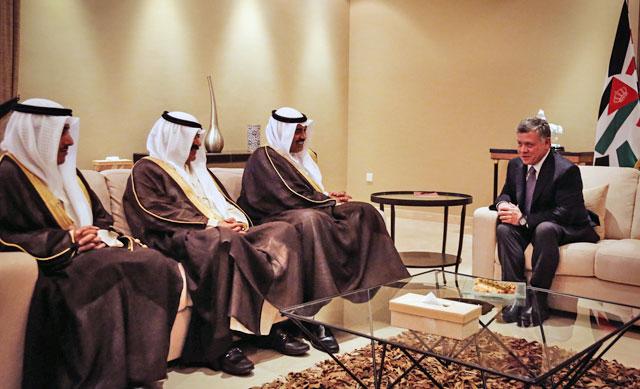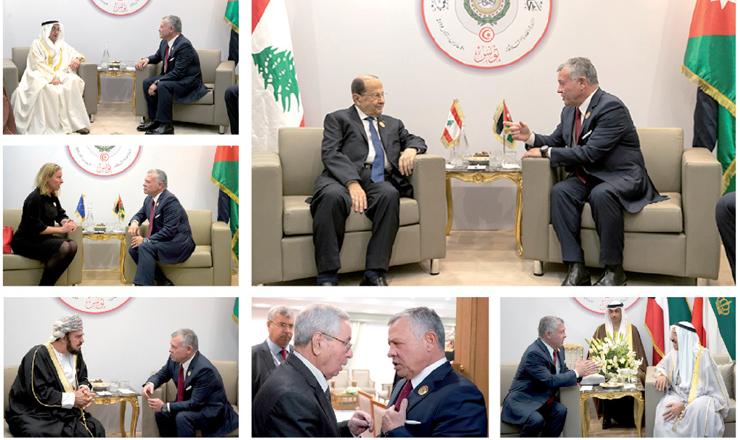You are here
King urges Arabs to embrace moderation as terrorism takes firmer foothold in region
By Mohammad Ghazal - Mar 25,2014 - Last updated at Mar 25,2014

KUWAIT — His Majesty King Abdullah on Tuesday said further sincere efforts are needed in the region to consolidate moderation, advance the principle of active citizenship and unleash the potential of future generations as the multiple conflicts in the region have created a fertile environment for the spread of extremism and terrorism.
The continuing crisis in Syria and the spread of extremist groups there portend disastrous consequences for the region and the world, King Abdullah said (see full text).
His Majesty said the Arab region continues to struggle with several challenges and threats arising from the failure to reach a just, comprehensive and lasting solution to the Palestinian cause, which is the Arabs’ primary cause and core conflict in the region.
King Abdullah made his remarks during the plenary session of the 25th Arab Summit held for the first time in Kuwait.
Mideast
He emphasised that the international community is required to assume its responsibilities, move immediately to compel Israel to stop its unilateral policies and measures, and urge it to take advantage of the Arab Peace Initiative and the historic opportunity available now to achieve peace.
“We have consistently stressed that the establishment of a sovereign and viable Palestinian state, based on the envisaged two-state solution, relevant international resolutions and the Arab Peace Initiative, is the basis for ending the Israeli-Palestinian conflict, achieving comprehensive peace and enrooting security and stability in the Middle East,” said the King.
His Majesty, who returned to the Kingdom later on Tuesday, elaborated that the achievement of these goals is a higher Jordanian interest, as Jordan hosts the largest number of Palestinian refugees and has among its top priorities the protection of their rights.
Jordan will also continue to carry out its religious and historical duty of preserving Jerusalem and its holy Islamic and Christian sites, he stressed.
The Kingdom will work to help Jerusalem’s Arab population stay on their land, support their steadfastness, strengthen their presence and stand up to address Israeli violations and measures, particularly those targeting Al Aqsa Mosque, by all available means and in coordination with the Palestinian leadership, the Monarch said.
Syria
Referring to the escalating Syrian crisis, the increasing magnitude of the human suffering of the Syrian people, the growing burden borne by Syria’s Arab neighbours, His Majesty said the solution to this crisis necessitates a swift and comprehensive political transition to end the suffering of the Syrian people, and meet their aspirations.
It must be a solution agreed upon by all parties, one which ensures that the entire political spectrum is represented, preserves the territorial integrity and political independence of Syria, and triggers internal reforms towards pluralism and democracy, leading to the return of Syrian refugees to their country, the Monarch said.
At present, Jordan hosts around 1,300,000 Syrian nationals, including approximately 600,000 who have taken refuge in the country since the outbreak of the crisis in Syria, according to the King.
“This makes us the third largest host of refugees in the world,” said the King, stressing the need to support the hosts of Syrian refugees, and enhance their capacities and capabilities, in addition to providing support to local communities affected by the influx of refugees within these countries, not to mention the need to improve humanitarian conditions inside Syria,” he said.
Pan-Arab challenges
In his address, King Abdullah said the increasing challenges facing the countries in the region after the transformations they have undergone require activating pan-Arab cooperation and joint action, which he said is the way to realise the aspirations of peoples to live in peace and security and build a better future.
King Abdullah stressed the significant role played by the Arab Parliament and the need to enhance its efforts.
At the summit, attended by 14 Arab leaders, the Palestinian issue and latest developments in the peace process took centre stage in the discussions of the leaders on Tuesday.
The leaders stressed that the Palestinian issue remains the core issue in the Middle East, noting that any solution should lead to the creation of an independent Palestinian state with East Jerusalem as its capital.
They condemned all Israeli attempts to Judaise Jerusalem and alter the identity of the city, slamming the Israeli violations against Al Aqsa Mosque. They warned that Israeli settlement activities and practices in the occupied Palestinian territories hamper peacemaking efforts and that the region will not enjoy peace until Israel gives up its hostile practices and policies and resorts to peace.
The Arab leaders called for settling inter-Arab disputes as they called for joint efforts to uproot terrorism, which they said is endangering the future of the region.
“The issue of widening differences between Arabs is saddening...We need a frank position and honest efforts to end the inter-Arab differences,” Emir of Kuwait Sheikh Sabah Al Ahmad Al Jaber Al Sabah said in his address at the opening session of the summit.
“These differences have spread in the Arab nation and started to destroy our existence, values, hopes and aspirations... these differences affected our ability to encounter challenges,” said Sheikh Sabah.
He stressed that all Arabs are required to end these differences and unify their efforts to overcome them, noting that the grand dangers surrounding the Arabs require concerted efforts to end the ongoing disputes.
“There is larger room for consensus than differences between Arabs,” said Sheikh Sabah.
Arab leaders at the summit said cooperation is highly needed among Arab states to eliminate terrorism, which is jeopardising the region’s stability and security. During the summit, Emir of Qatar Sheikh Tamim Bin Hamad warned fellow states against branding groups as terrorists for political purposes.
In his address, Sheikh Sabah said: “ We all suffer from terrorism... We are required to double our efforts and join international efforts seeking to put an end to this dangerous phenomenon regardless of its types, goals or sources.”
Saudi Arabian Crown Prince Salman Bin Abdul Aziz, who is also deputy premier and minister of defence, said: “We are required to be cautious and take necessary measures to combat and uproot terrorism.... [which] has become a tool to spread chaos, division and sow seeds of sedition, which necessitates a joint and unified stand to face it.”
At the end of the two-day summit, a statement dubbed the “Kuwait Declaration” is expected to be announced.
Related Articles
His Majesty King Abdullah on Tuesday met with the emir of Kuwait, Sheikh Sabah Al Ahmad Al Jaber Al Sabah, on the sidelines of the Arab summit currently hosted by Kuwait.
His Majesty King Abdullah on Sunday received Kuwait’s First Deputy Prime Minister and Foreign Minister Sheikh Sabah Al Khaled Al Hamad Al Sabah.
AMMAN — His Majesty King Abdullah on Sunday held talks with Arab and world leaders on the sidelines of the 30th Arab summit in Tunisia.Durin


















